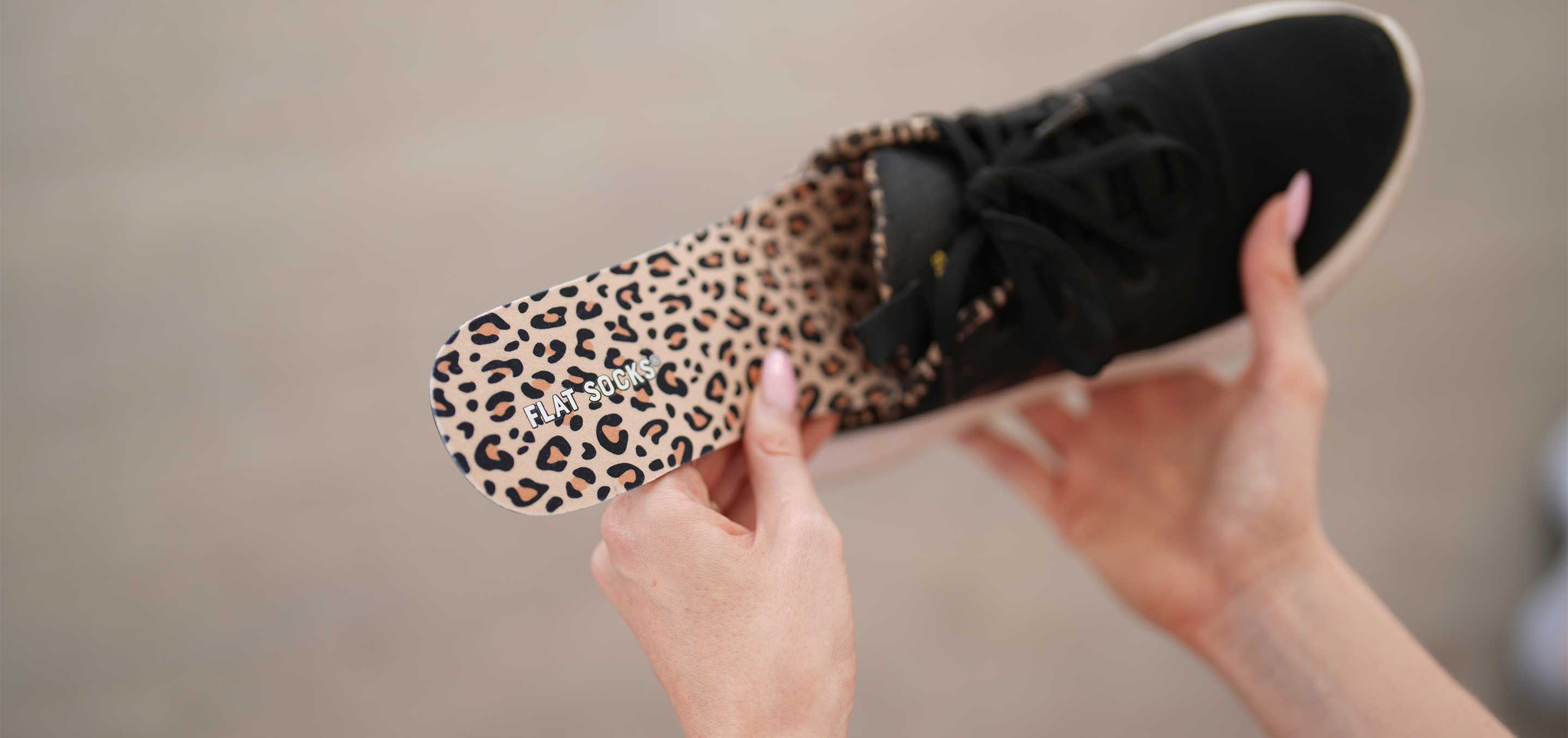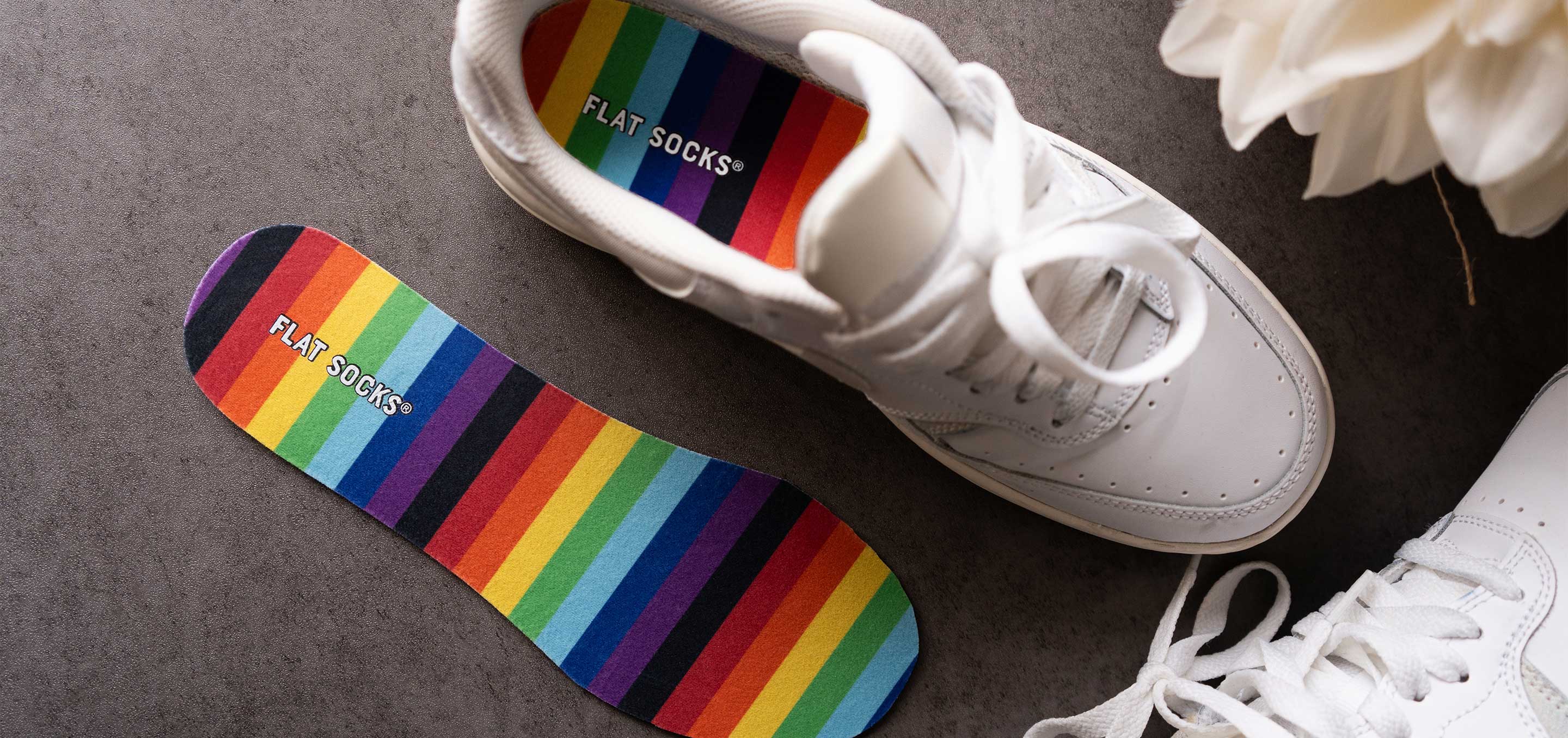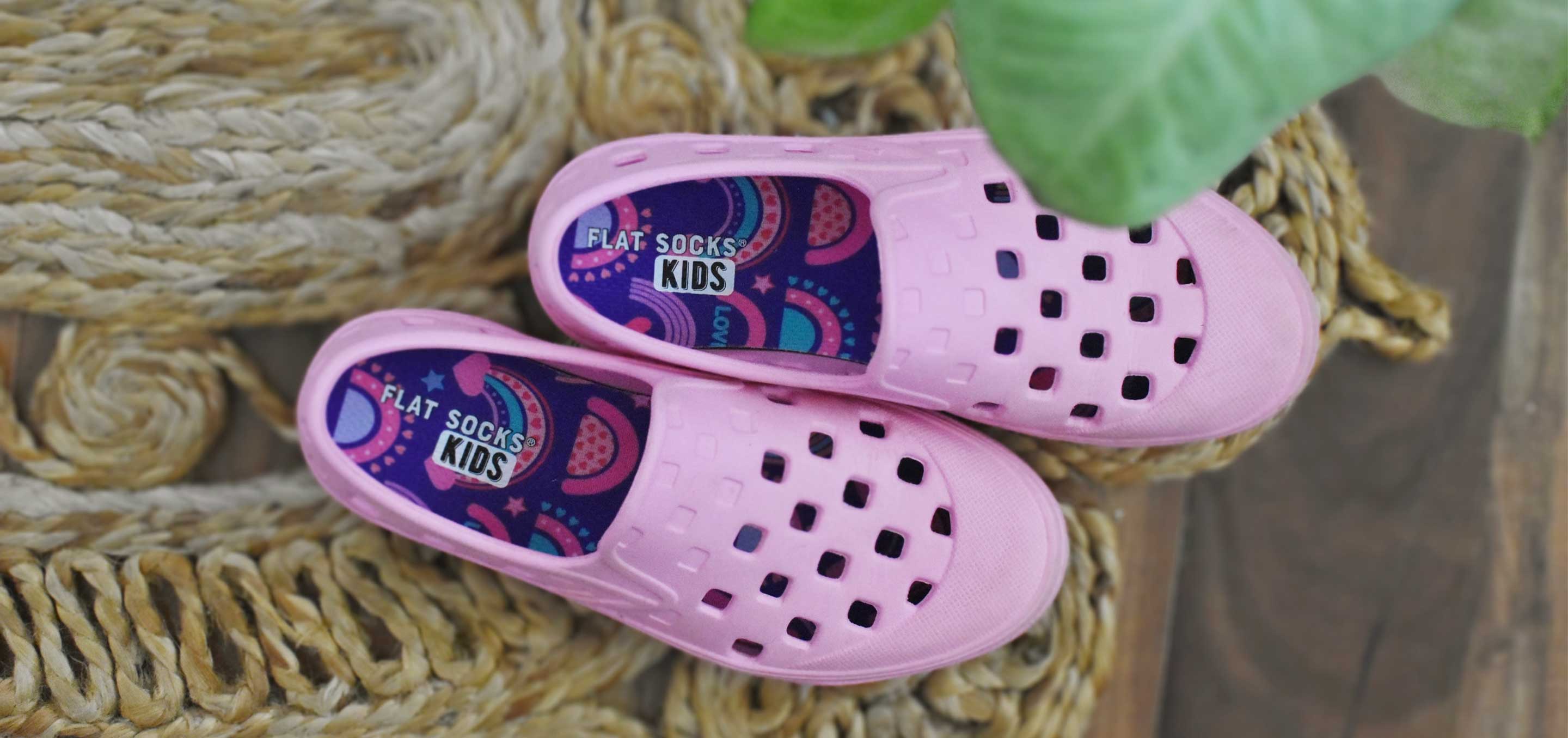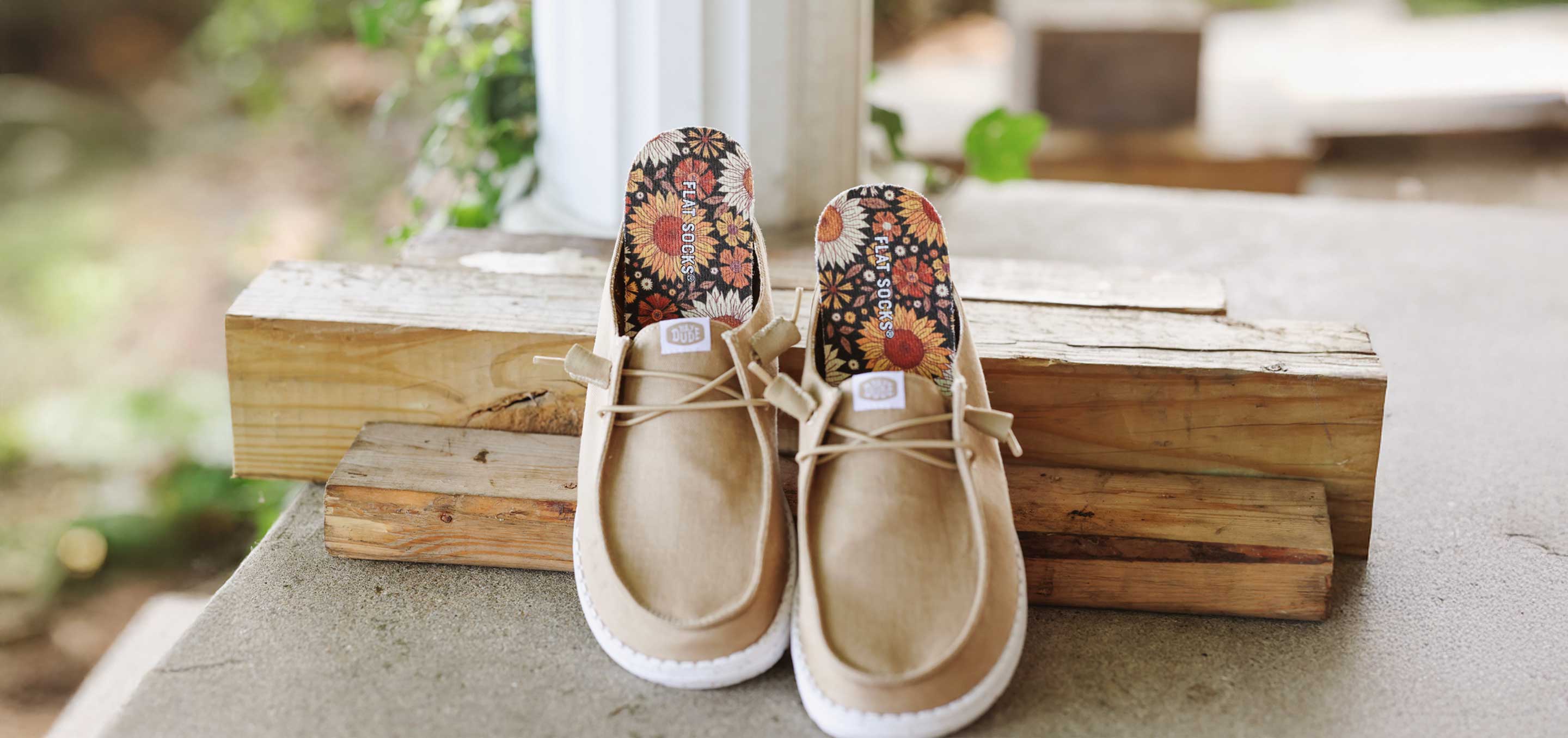Hyperhidrosis & Sweaty Feet

Why Do My Feet Sweat So Much?
Ever wonder if you might just be... overreacting? Well, not you. But your feet. Hyperactive sweat glands can cause excessive sweating in certain areas of the body, otherwise known as hyperhidrosis. If you have extremely sweaty feet, you might have a condition called plantar hyperhidrosis. FLAT SOCKS sockless shoe inserts help you fight the sweat (and the stink) for feet that stay dry, cool, and comfortable.

What is Plantar Hyperhidrosis?
Hyperhidrosis is a medical condition in which certain areas of the body, like the feet, armpits, or palms, sweat more than what’s considered normal. Hyperhidrosis of the feet, otherwise known as plantar hyperhidrosis, causes excessively sweaty feet and usually correlates with sweaty hands, too.
Plantar hyperhidrosis starts early in life, often during childhood. In fact, some kids won’t wear socks because of sweaty feet. Between 2% and 5% of people have hyperhidrosis, however there could be more since many are either unaware they have it or feel too embarrassed to discuss their problems with sweat.
Soggy socks and shoes can negatively impact your personal, social, and professional life. You might avoid certain social situations, have difficulty walking without slipping, or refuse to wear open toe shoes. While hyperhidrosis of the feet is uncomfortable, it can also make you more prone to infections and create what we like to call a stinky swamp in your shoes.

What Causes Excessive Feet Sweating?
There are a few possible reasons why your feet sweat too much. Hormones, stress, anxiety, physical activity, and high temperatures all send signals to your brain that your body is overheating, and you need to sweat to cool it down. In people with hyperhidrosis, once the body starts to sweat, it’s hard to stop.
On the other hand, there may be no exact cause at all. Your feet might sweat just to sweat. Yeah, we know. Not very helpful. But, hey, c’est la vie, am I right?
For the most part, experts believe hyperhidrosis is an inherited skin disorder, meaning sweaty feet may run in the family. Discuss this possibility if you choose to see a doctor about your condition.
Symptoms & Complications
Managing symptoms of plantar hyperhidrosis can be a constant challenge from changing your socks several times a day to finding a way out of the inevitable, “What’s that smell?” If your feet sweat too much, you might also experience the following:
- Slipping easily out of your shoes
- Blisters from friction
- Chronically cold feet
- Frequent infections like athlete’s foot or toenail fungus
- Foot odor
- Itchy feet or toes
- Noticeable staining on the inside of your shoes
- Pale or wrinkled feet
- Softened or raw skin on your soles

Does Hyperhidrosis Make Your Feet Smell?
It’s a match made in your shoes: sweat and foot odor. Sweat itself does not smell, but the dark, moist environment in sweat-soaked shoes encourages bacteria to grow, interacting with the sweat, and causing body odor.
The main problem with sweaty feet is not just the smell. Excessive moisture breaks down skin and allows bacteria, fungus, and other pathogens to get inside. These infections can also lead to unwanted foot odors, itchiness, soreness, and may or may not require antibiotics.
Plantar hyperhidrosis does not always make your feet smell. Because the sweat is constant, bacteria have less chance to grow. As long as you keep your shoes dry and wear moisture-wicking socks like FLAT SOCKS, you can avoid the stench.
Treatment for Plantar Hyperhidrosis
Healthcare providers can diagnose hyperhidrosis by discussing your family history, symptoms, and how often you struggle with feet sweat. Then, they will recommend treatments options to reduce symptoms. Here are a few things you can do if your feet sweat too much:
- Use antiperspirants for your feet to clog sweat ducts and stop producing sweat
- Wear FLAT SOCKS barefoot shoe inserts that wick away moisture, control odor, and let your feet breathe
- Try foot powders to absorb moisture and prevent infections
- Dry your shoes regularly
- Wash feet daily to reduce bacteria and dry completely

For severe cases of plantar hyperhidrosis, there are medical treatments available. Prescription oral medications provide temporary relief, while having Botox injections from a qualified provider keeps sweat glands from being activated. These injections can be painful and only help in the short-term.
Iontophoresis is a long-term solution for hyperhidrosis of the feet. The weekly treatment uses a mild electrical current that passes through water to your feet to reduce hyperactivity of your sweat glands.
FLAT SOCKS: The Best Socks for Hyperhidrosis & Sweaty Feet
Worried about foot sweat or odor stopping you from living your best life? FLAT SOCKS are the best socks for plantar hyperhidrosis because they absorb sweat, control odor, and never slip. Not only can you trim them to fit any shoe, but these convenient sockless shoe inserts are machine washable, too!
Wear any shoe you want and express your style without fear of sweat and odor getting in your way. FLAT SOCKS are available in tons of classic designs and patterns to suit your individual style and your need for sweat-free feet.

FLAT SOCKS does not diagnose or prescribe treatment for any type of medical condition. This article is for informational purposes only. Always contact your physician or healthcare provider for medical advice.
References:
Hyperhidrosis Can Affect Your Feet, Too—Here’s What You Can Do About It, According to Dermatologists. (n.d.). Health. Retrieved March 15, 2023, from https://www.health.com/condition/hyperhidrosis/hyperhidrosis-feet
Plantar Hyperhidrosis NYC | The Center for Hyperhidrosis. (n.d.). Retrieved March 15, 2023, from https://www.hyperhidrosiscumc.com/plantar-hyperhidrosis/
Hyperhidrosis: Causes, Symptoms, Treatment & Lifestyle Changes. (2020, October 9). Cleveland Clinic. https://my.clevelandclinic.org/health/diseases/17113-hyperhidrosis










